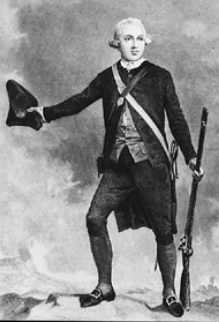WARREN COUNTY'S NAME Warren County Iowa was named after Joseph Warren (June 11, 1741-June 17, 1775) who was a doctor and a martyr in the American Revolutionary War. He sent Paul Revere on his midnight ride to warn of the British invasion. When nearly killed in battle from a musket ball striking his head, he didn't stop fighting but said, "Now is not the time for any of American's children to shrink from any hazard. I will set her free or die." He was killed in the Battle of Bunker Hill and buried by the British in a hole with other "rebels." Later his brother and Paul Revere identified his body (by his artificial tooth) and Joseph was reburied in Forest Hills Cemetery in Massachusetts. Source: Wikipedia, the online free encyclopedia on Joseph Warren |
 |
Joseph Warren (1741 - 1775) |
FIRST PIONEERS It is believed that the first settler on the territory now included in Warren County, was John D. Parmalee. He erected a saw mill on Middle River about the time the military post was established at Raccoon Forks, or very soon after, in the year 1843. The mill was erected at the instance, and under the supervision of the military, as this part of Iowa was still in the possession of the Indians. By the terms of the treaty made at Agency City, October 11, 1842, the title of the Indians expired October 11, 1845. In the Spring of this year, however, William Mason selected his location about two miles north of Palmyra, and remained on it during the Summer, although not permitted by the government to make any improvements. Among the early settlers were, Henry James, Robert Rees, P. P. Henderson, Alexander Gindler, Samuel Hayworth, Joseph Scott, D. Booker, and Messrs. Myric, Paul, and Dotson. When Polk County was organized under an act of the Legislature passed January 17, 1846, it included the territory now embraced in the northern tier of townships of Warren County, so that Mr. Parmalee's saw mill was at that time really in Polk County. In January, 1849, Warren County was organized with its present boundaries; the first County Commissioners being Samuel Hayworth, Alexander Gindler, and D. Booker. P.P. Henderson was the sheriff who officiated in the organization. Indianola, the county seat, was located in December following, and building commenced on the town site in the Spring of 1850. County Officers in 1875 ISAAC G. WRIGHT, Auditor
|
|---|